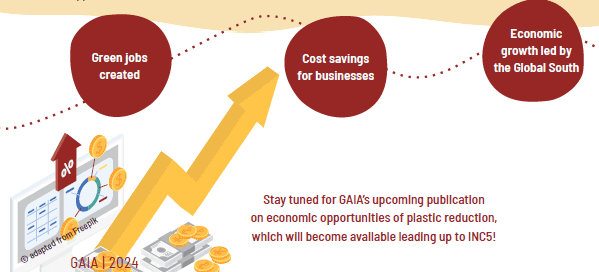Member Opinion By Gilbert Kuepouo, CREPD
Cameroon, a country with a population of around 23 million and a diverse climate, is known for its rich biodiversity and strong economy. However, waste management continues to be a significant challenge, despite the existence of policies on paper. It’s really disheartening to witness the sight of plastic bottles, plastic bags, and old rubber tyres being thoughtlessly discarded on vacant land, coastlines, rivers, bays, and streams, with the potential to be carried to other bodies of water, like the ocean. Several factors, including economic growth and shifting consumption and production patterns, have led to a significant rise in the production and use of plastics in Cameroon. As a result, plastic waste has become a prominent and expanding component of municipal solid waste. Pollution is a pressing issue that demands our attention.
Since November 2023, CREPD (Centre de Recherche et d’Education pour le Développement) has been actively involved in a range of initiatives to tackle the issue of plastic pollution in Cameroon. The goal is to raise awareness and highlight the significance of this problem by engaging with local communities, businesses, government authorities, and relevant ministries. Our efforts include conducting brand audits and organizing clean-up activities, sharing information, creating outreach materials, and launching a social media campaign to foster better communication, coordination, and commitment among all relevant national stakeholders in tackling plastic waste and its proper management.
The project partners include the Ministry of Environment, Protection of Nature, and Sustainable Development (MINEPDED) of Cameroon and UNITAR. The Basel Convention Small Grant Programme on Plastic Waste and GAIA (Plastic Solutions Fund) are funding the project.
Some of our project outcomes include:
- The PWWG (Plastic Waste Working Group) has been established in Cameroon to effectively manage and address the issue of plastic waste. This group will play a crucial role in informing and implementing policies related to plastic waste management, both at the national and international levels. The PWWG has clear terms of reference that will guide its actions and ensure effective outcomes.
- Facilitating community engagement meetings and sharing important information about the health effects of plastic waste (such as the presence of harmful chemicals that can lead to infertility, cancer, and harm to the fishing industry).
- Organizing the clean up of the river Wouri waterways and shores, as well as establishing a swap-shop for discarded plastic fishing nets. Approximately 4 tonnes of fishing nets have been gathered and carefully stored, awaiting transportation for environmentally responsible recycling.
- We conducted a thorough investigation into the plastic waste issue, specifically focusing on the major polluters. The results revealed 64 significant contributors to the problem, with Nestlé, Source du Pays SA, SABC Group, CHOCOCAM, and HOKA Industries being the top five offenders. Surprisingly, these companies alone accounted for a staggering 36 percent of the total single-use plastic waste.
Plastic waste is becoming a rapidly increasing problem in Cameroon and around the world. Plastics, including plastic waste, can contain harmful substances that are released into the environment during use and disposal. These substances have been linked to issues such as infertility and cancer, which are often overlooked when discussing plastic pollution.
When it comes to tackling plastic pollution, it’s important to consider solutions that focus on eco-design for reuse and recycling. By following the waste hierarchy, which prioritizes preventing and minimizing waste generation, we can make a significant impact.
The government should ensure that regulatory measures, such as EPR in waste management, are effectively enforced. In 2021, there were a total of 63 enterprises engaged in the manufacturing of plastic products. In 2021, national plastic production reached a staggering 153,000 metric tonnes. However, it is disheartening to note that a significant amount of plastic products, totalling 88,000 metric tonnes, were illegally introduced in Cameroon during the same period. Every year, a staggering 6,000 metric tonnes of plastic waste are generated. Every year, an estimated 3000 tonnes of plastic are discharged into the ocean by the Wouri River. The amount of plastic that is released into the ocean each year by the Wouri River is quite substantial, and it has a significant impact on the pollution levels in the surrounding area.
In conclusion, efforts must be made to address the issue of illegal plastic waste disposal in Cameroon to prevent further environmental degradation and protect marine life. Additionally, implementing stricter regulations and increasing public awareness of proper waste management practices are crucial steps in reducing plastic pollution in the region.
Ends.




























